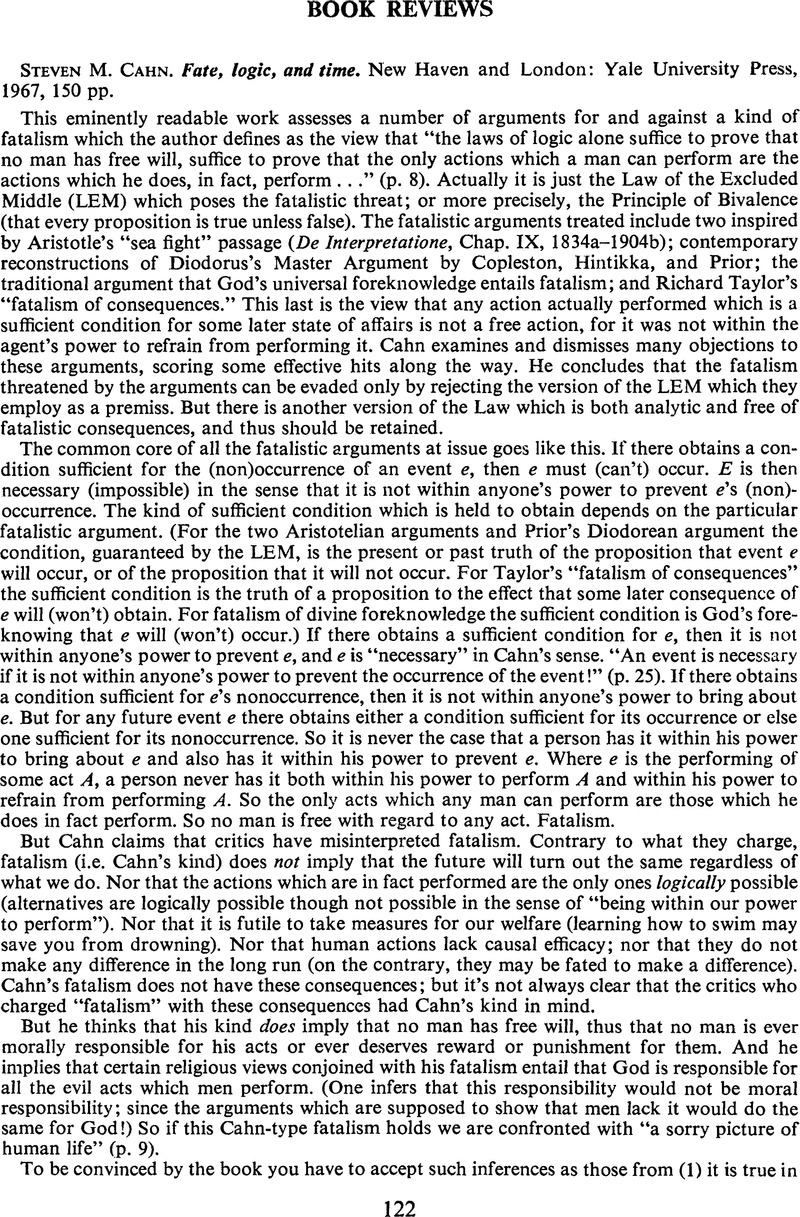Article contents
Steven M. Cahn Fate, logic, and time. New Haven and London: Yale University Press, 1967, 150 pp.
Published online by Cambridge University Press: 14 March 2022
Abstract

- Type
- Book Reviews
- Information
- Copyright
- Copyright © 1971 by The Philosophy of Science Association
References
1 The statement “It is epistemically necessary that p,” or more familiarly “It's got to be that p” can be truly asserted by a person P at time t only if, roughly, “p” is entailed by a corpus of truths which P at t knows to be true, or which at t are generally known to be true, or easily discoverable from what is generally known to be true.
2 On an alternative construal, the corpus must be a single truth which is logically equivalent to “p” itself, such as “It is the case that p.” This, too, would indicate that necessityT is a degenerate limit-case.
3 Another indication of degeneracy is that necessityT usually shows up within conditionals, where the antecedent is the corpus and the consequent is the modal statement yielded by the corpus. We seldom see it or its quasi-modal ordinary-language counterparts used to make categorical statements, as it is in the following silly dialogue:
“It must be the case that he'll go” (NecessarilyT p).
“Why?”
“Because the statement that he will go is true!” (relevant corpus).
4 And we know in general that not all modal operators are freely translatable into what look like related quasi-modal terms of ordinary language, or vice versa. For instance “It is (epistemically) possible that P will do X” does not entail “P has the ability (quasi-modal expression) to do X,” though the latter does entail “P can do X” in some appropriate sense of “can.” For it may be epistemically possible relative to us how that Rufus will pass the exam, ignorant as we are of his lack of the intellectual ability to do so. And James may have the ability to grow a beard, though he knows that he won't. So we need a convincing argument to go from “It is necessaryT that P will do A” to “It is not in P's power to refrain from doing A.” We don't have one. And it's doubtful that the inference is legitimate, since statements like the following seem to be true at times: “It is in my power to withhold this information from you, if I choose, but I know that I will impart it to you in three minutes, having made up my mind to do so.” If the inference were legitimate we would have to say that whenever a person decides to try to do A and knows in virtue of his intention that he will try to do A, he thereby lacks the power not to try! Apparently he can't change his mind.
5 This issue is discussed in “The Truth About Tomorrow's Sea Fight,” Journal of Philosophy, LXVI, June, 1969; the preceding one in “Is The Future Partly Unreal?” Review of Metaphysics, March, 1968.
- 1
- Cited by


